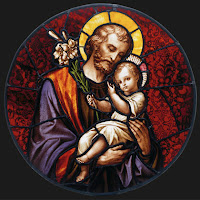Praised be Jesus, Mary, and Joseph!
 “Do not be afraid! Behold, I
proclaim to you good news of great joy that will be for all people. Today in
the city of David, a savior has been born to you who is Christ the Lord. And
this will be a sign for you: you will find an infant wrapped in swaddling
clothes and lying in a manger.” The words of the angel tonight tell us of a
Christmas that seems to be so far from what we know of it today. Indeed we all
acknowledge the fact that this night is a night of great joy. But for many
people, joy would mean merrymaking: food, wine, shopping and revelry. We all
come here to church in our best look: new clothes, and even shoes. There is
great expectation for gifts and of course, lots of love…love as in hugs and
kisses.
“Do not be afraid! Behold, I
proclaim to you good news of great joy that will be for all people. Today in
the city of David, a savior has been born to you who is Christ the Lord. And
this will be a sign for you: you will find an infant wrapped in swaddling
clothes and lying in a manger.” The words of the angel tonight tell us of a
Christmas that seems to be so far from what we know of it today. Indeed we all
acknowledge the fact that this night is a night of great joy. But for many
people, joy would mean merrymaking: food, wine, shopping and revelry. We all
come here to church in our best look: new clothes, and even shoes. There is
great expectation for gifts and of course, lots of love…love as in hugs and
kisses.
But the good news of great joy is
not about food, gifts and good company. It is about the birth of a savior, who
is both Christ and Lord. The angel does not invite us to attend a grand
Christmas ball. He tells us to go to the City of David, not to search for some
celebrity wrapped in finery but for a new-born baby wrapped in swaddling
clothes and lying in a manger. Christmas is not about glitter and tinsel.
Rather it is about the darkness of the night made radiant by choirs of angels
praising God as they sang: Glory to God in the highest and on earth peace to
those on whom his favor rests! Christmas is not about parades. It is about a
procession of shepherds to Bethlehem to see for themselves whatever the angel
told them. And it would all be in accord with what they were told: a baby
wrapped in swaddling clothes, lying in a manger. They would behold him: Savior,
Christ, Lord, Wonder-Counselor, God-Hero, Father-Forever, Prince of Peace. They
would behold him not wrapped in finery but in swaddling clothes, not in comfort
but in a manger.
Padre Pio said: "The heavenly Babe suffers and cries in the crib so that for us
suffering would be sweet, meritorious and accepted. He deprives himself of
everything, in order that we may learn from him the renunciation of worldly
goods and comforts. He is satisfied with humble and poor adorers, to encourage
us to love poverty, and to prefer the company of the little and simple rather
than the great ones of the world."
Christ made himself
poor to be close to the poor. Pope Francis wrote: “ God’s heart has a special place for the poor, so much so that
he himself “became poor” (2 Cor 8:9).
The entire history of our redemption is marked by the presence of the poor.
Salvation came to us from the “yes” uttered by a lowly maiden from a small town
on the fringes of a great empire. The Saviour was born in a manger, in the
midst of animals, like children of poor families; he was presented at the
Temple along with two turtledoves, the offering made by those who could not
afford a lamb (cf. Lk 2:24; Lev 5:7); he was raised in a home of
ordinary workers and worked with his own hands to earn his bread. When he began
to preach the Kingdom, crowds of the dispossessed followed him, illustrating his
words: “The Spirit of the Lord is upon me, because he has anointed me to preach
good news to the poor” (Lk 4:18).
He assured those burdened by sorrow and crushed by poverty that God has a
special place for them in his heart: “Blessed are you poor, yours is the
kingdom of God” (Lk 6:20);
he made himself one of them: “I was hungry and you gave me food to eat”, and he
taught them that mercy towards all of these is the key to heaven (cf. Mt25:5ff.).” (Francis,
Evangelii Gaudium, 197.)
“God shows the poor “his first
mercy”. This
divine preference has consequences for the faith life of all Christians, since
we are called to have “this mind… which was in Jesus Christ” (Phil 2:5).
Inspired by this, the Church has made an option for the poor which is
understood as a “special form of primacy in the exercise of Christian charity,
to which the whole tradition of the Church bears witness”. This option –
as Benedict
XVI has
taught – “is implicit in our Christian faith in a God who became poor for us,
so as to enrich us with his poverty”. This is why I want a Church which is poor
and for the poor. They have much to teach us. Not only do they share in the sensus
fidei, but in their difficulties they know the suffering Christ. We need to
let ourselves be evangelized by them. The new evangelization is an invitation
to acknowledge the saving power at work in their lives and to put them at the
centre of the Church’s pilgrim way. We are called to find Christ in them, to
lend our voice to their causes, but also to be their friends, to listen to
them, to speak for them and to embrace the mysterious wisdom which God wishes
to share with us through them.” (EG, 198.)
The Pope does not speak only of activities
or programmes of promotion and assistance. Above these, he is speaking of
loving attentiveness to the poor. “This loving attentiveness is the beginning
of a true concern for their person which inspires me effectively to seek their
good. This entails appreciating the poor in their goodness, in their experience
of life, in their culture, and in their ways of living the faith. True love is
always contemplative, and permits us to serve the other not out of necessity or
vanity, but rather because he or she is beautiful above and beyond mere
appearances: ‘The love by which we find the other pleasing leads us to offer
him something freely’. The
poor person, when loved, ‘is esteemed as of great value’, and this is
what makes the authentic option for the poor differ from any other ideology,
from any attempt to exploit the poor for one’s own personal or political
interest. Only
on the basis of this real and sincere closeness can we properly accompany the
poor on their path of liberation. Only this will ensure that ‘in every Christian
community the poor feel at home. Would not this approach be the greatest and
most effective presentation of the good news of the kingdom?’ Without the
preferential option for the poor, ‘the proclamation of the Gospel, which is
itself the prime form of charity, risks being misunderstood or submerged by the
ocean of words which daily engulfs us in today’s society of mass communications’.
(EG 199)
The Lord Jesus said: I will be
with you until the end of times. He also said: The poor you will always have
with you. Both are connected: Jesus will always be with us…not just through his
abiding presence in the Blessed Sacrament, but also in and through the poor.
And so if we are attentive to the poor, we become attentive to Jesus. Let this
be our gift to Jesus: a Christmas closer to his Christmas…a Christmas of
essentials, a Christmas of sharing, a Christmas for the poor. May our parish be
a place where the poor feel at home for it is only in being so that we can
truly and effectively proclaim the gospel of the Kingdom.
Jesus, I trust in you. o Mary
conceived without sin, pray for us who have recourse to thee.









No comments:
Post a Comment